Discover our treatments
Dental Implants
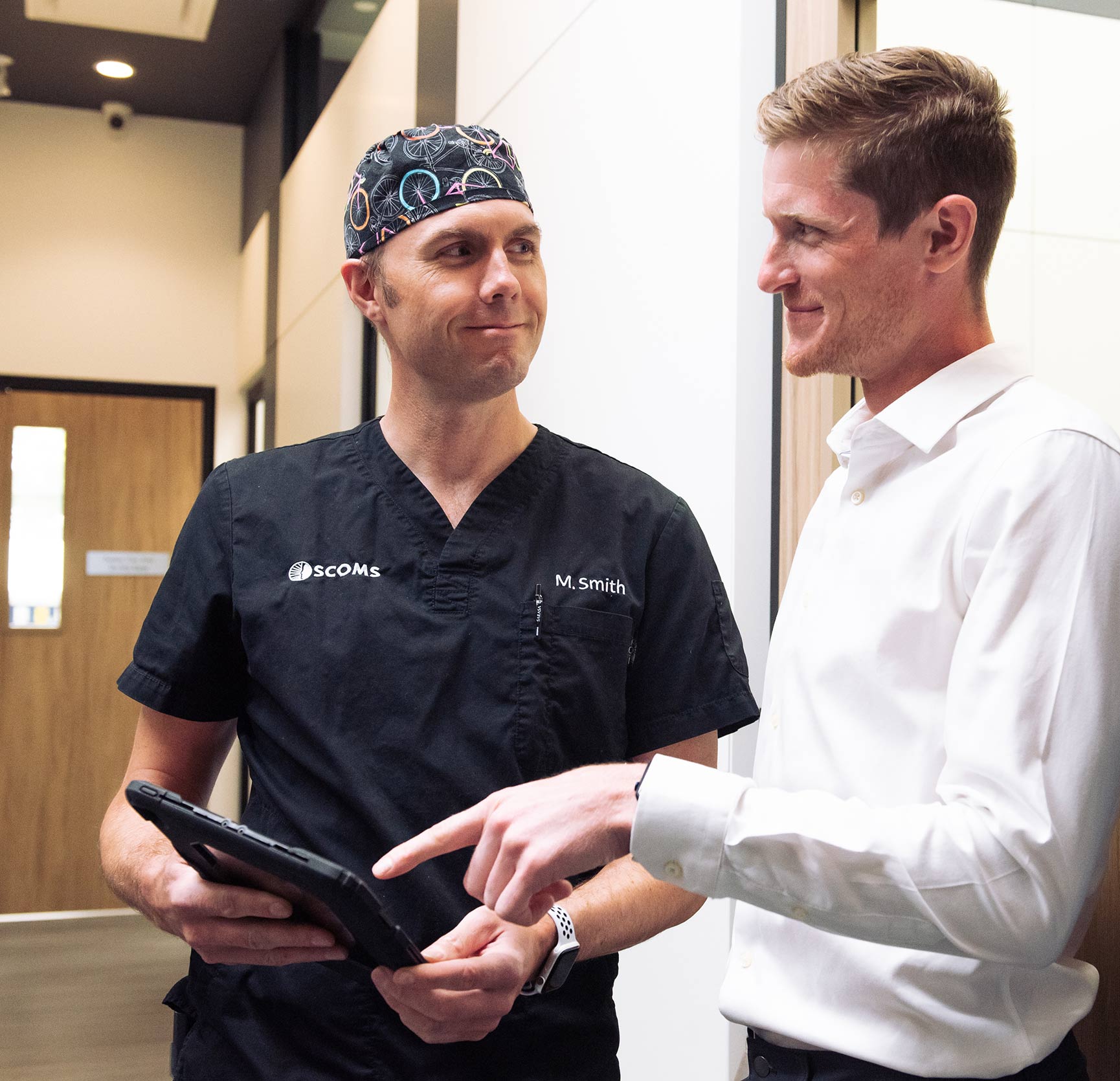
Dental implants are changing the way people live!
They can improve the quality of life, comfort and esthetics, they look, feel and function like natural teeth.
What are Dental Implants?
They can improve the quality of life, comfort and esthetics, they look, feel and function like natural teeth.
- Dental implants preserve bone and facial structure.
- Dental implants are stable in your mouth, and they feel and function like natural teeth.
- Implants are designed to have long-term success.
- No more limiting food choices, removable dentures or a slurring speech
The Surgical Procedure
For most patients, the placement of dental implants involves two surgical procedures.
For the first three to six months following surgery, the implants integrate with the jawbone. You should be able to wear temporary dentures and eat a soft diet during this time. At the same time, your dentist is forming new replacement teeth.
After the implant has healed to the jawbone, the second phase begins.
We will uncover the implants and attach small posts which will act as anchors for the artificial teeth. These posts protrude through the gums. When the artificial teeth are placed these posts will not be seen. The entire procedure usually takes four to eight months. Most patients experience minimal disruption in their daily life.
FAQ's
We carefully plan our dental implant treatments to have more predictable outcomes. At your initial consultation one of our oral surgeons will examine your mouth thoroughly, and will review your medical and dental history. If your mouth is not ideal for implants, there are ways of improving outcome, such as bone grafting may be recommended.
- Single Teeth
- Multiple Teeth
- Full-denture supported (ideal for patients who have an ill-fitting denture)
Dental implants preserve jaw bone and unlike fixed bridges or removable dentures, dental implants do not compromise the neighbouring healthy teeth. The natural appearance of the smile and face contour is preserved with dental implants.
In addition, patients wearing partials or dentures can experience bone resorption which occurs as a result of not replacing lost teeth. Dental implants can prevent bone resorption.
Once the implants are in place, they will serve you well for many years if you take care of them and keep your mouth healthy. This means taking the time for good oral hygiene (brushing and flossing) and keeping regular appointments with your dental specialists.
The majority of dental implants and one graft can be performed in the office under local anesthesia with or without intravenous sedation or general anesthesia.
- Dental Implants: Post-operative instructions
- Swelling is expected to peak at 48 hours and will likely be present for at least 2-3 weeks following surgery.
- Sit upright, apply ice and gauze pressure as tolerated. Bleeding can persist on and off for 2-4 days.
- Sleep with your head elevated on 2-3 pillows for at least one week.
- Use ice 20 minutes ON and 20 minutes OFF for the first 48 hours after surgery. Ice can also be used for up to 4-5 days following surgery to help with discomfort. After 4-5 days, switch to moist heat.
- Take all pain medications as prescribed for at least 48 hours. Alternate the anti-inflammatory (eg. ibuprofen, naproxen) with the Tylenol-based medication (eg. Extra Strength Tylenol, Tylenol #3, Tramacet) every 3 hours (ie. start with ibuprofen—> 3 hours later—>Tylenol product—> 3 hours later—> ibuprofen—> etc.).
- Nausea may occur for the first few days after surgery. Drinking clear fluids (eg. water or ginger-ale) can help ease nausea. Taking medications with food will also help.
- If nausea persists, avoid narcotic medications. Try using ibuprofen and plain Tylenol for management of any discomfort.
- Stay on a soft chew diet for at least 3 weeks following surgery. Your surgeon will direct any diet changes/recommendations moving forward. Do not use a straw for one month following surgery.
- Diet:
- Soft chew
- Blended
- Liquid
- You may have had antibiotics prescribed. Please take them to completion.
- Use the prescribed mouth rinse 3-4 times daily (after eating and before bedtime). Rinse for 1 minute then spit; do not swallow. Rinse several times a day with salt water as well.
- The day after surgery, you can begin brushing your teeth – teeth next to any surgical area(s) should be brushed gently). If dental implants have been placed and a portion of your implant structure is visible (ie. the healing abutment), you may start brushing the abutments 1 week after surgery. Use only a manual toothbrush to this area. You may use your electric toothbrush to your other teeth. No flossing adjacent to the implants for 2 weeks.
- Dissolving stitches are commonly used. These may dissolve in 10-14 days OR may last up to 4-6 weeks depending on the type of suture used.
- If you have any non-dissolving sutures, you will receive an appointment for removal.
- Please contact us immediately if you notice that tissues have “opened up” to the graft site and/or implant site.
- Early mobilization and walking assist with recovery. Sit upright in a chair to help with swelling and breathing.
- Do not lift more than 5-10 pounds for at least 6 weeks as directed.
- Avoid all contact sports or activities that put you at risk for getting hit in the face for at least 2-3 months.
- Do not smoke cigarettes, e-cigarettes or marijuana as this affects healing and increases the risk of implant or bone graft failure.
- If you have had a Sinus Lift Bone Graft performed, please avoid blowing your nose for at least one month following surgery.
Please call our office first with any questions or concerns at 403-271-1665 or 1-800-342-0382. A doctor is on-call 24 hours/day, 7 days/week. If you are calling after hours, please listen to the emergency message at the phone number(s) provided. You can then leave a message at the designated phone number and the Doctor will call you back. If you are admitted to the hospital within 10 days of surgery, please notify us immediately.
Wisdom teeth removal
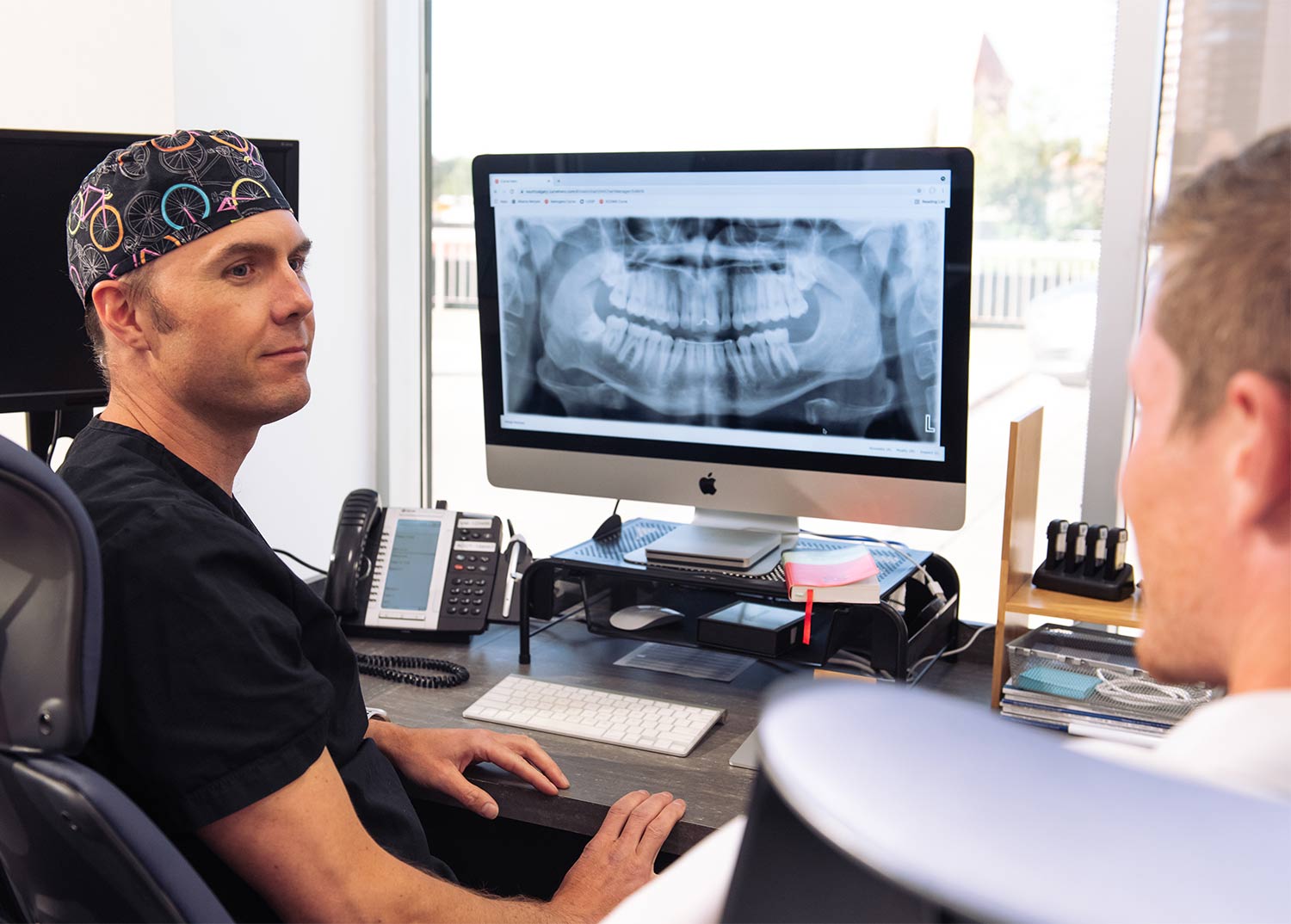
The surgeons at South Calgary Oral and Maxillofacial Surgery will evaluate the position of your wisdom teeth and decide if there may be present or future problems.
The average person develops wisdom teeth during their early or late teenage years. These teeth develop in the back of the mouth and are the last teeth to erupt. Frequently, there is not enough room in the mouth to accommodate the teeth coming into a proper chewing position. Due to lack of space, these teeth come in at odd angles or only partially through the gum tissue.
- Our oral and maxillofacial surgeons specialize in performing extractions of wisdom teeth.
- We manage complicated cases and complications
- We offer a general anesthesia facility with certified medical anesthesiologists.
- Our staff is fully emergency trained.
- A patient experience that focuses on communication, making our patients comfortable and providing a safe environment.
- A friendly and welcoming staff
Accreditation by:



Wisdom Teeth Surgery-What to expect
Sedation
Your oral surgeons will provide you with various anesthesia options for your surgery. In most cases, the surgeons at South Calgary Oral and Maxillofacial Surgery recommend general anesthesia or intravenous sedation for removal of wisdom teeth.
Surgery
The day of surgery we will ask that an accompanying adult be present with you. The procedure takes approximately an hour.
Recovery
Recovery is done in our recovery room, immediately after surgery, you will feel a bit drowsy. We will monitor your recovery until you are ready to go home with the person accompanying you to the surgery.
Aftercare
Our nurses will review all post-operative instructions with you before leaving our clinic. We will follow-up with all our patients to ensure a comfortable and speedy recovery.
FAQ's
Removal of wisdom teeth is recommended when these teeth are unable to properly erupt within the mouth. They may come in at various angles, partially break through the gum tissue or remain completely buried beneath the gum tissue and bone.
It is generally considered a good idea to remove these teeth when individuals are younger since surgery tends to be easier and as well, there are usually fewer postoperative complications and risks.
What is an impacted wisdom tooth? It is a wisdom tooth that grows into the mouth improperly. It is ‘impacted’ because there is insufficient room in the jaw to accommodate it, thereby growing crookedly or by pushing onto adjacent teeth.
While symptoms of an impacted wisdom tooth can vary from one patient to the other. These are some of the most common symptoms of an impacted wisdom tooth:
- Jaw pain
- Swollen, tender or bleeding gums
- Bad breath
- Discomfort when opening mouth
- Unpleasant tastes in the mouth
- Wisdom Teeth: Post-operative instructions
- Take all medications as prescribed. If you were given an antibiotic, please take it to completion (unless directed otherwise).
- Medications on an empty stomach may cause nausea/vomiting. Take all medications with food and fluids.
- Local anesthetic (dental freezing) will last anywhere from 2 to 6 hours and at times up to 12 hours.
- Alternating an anti-inflammatory medication (eg. ibuprofen, naproxen) with a Tylenol-based medication (eg. Tylenol, Tylenol 3, Tramacet) is recommended (ie: start with ibuprofen → 3 hours later → Tylenol → 3 hours later → ibuprofen etc.).
- Pain will peak at 48 hours and improve slowly over the next few days.
- Bite down with firm, constant pressure and change the gauze every 30 minutes as bleeding persists throughout the day. Minor bleeding can continue for a few days following surgery. Gauze packs are not needed for this level of bleeding. If heavier bleeding does occur, bite down firmly on a dry, black teabag (wrapped in a piece of gauze). Apply constant bite pressure for 45-60 minutes before removing.
- Remove gauze when going to bed at night or if napping. Sleep with your head slightly elevated for 48 hours after surgery.
- Avoid aggressive spitting and hot fluids/foods for the next 48 hours.
- Swelling is to be expected following surgery. The degree of swelling can vary widely among patients.
- As a rule, swelling peaks at 48 hours and persists for 1-2 weeks.
- Use ice 20 minutes ON and 20 minutes OFF for the first 48 hours after surgery. Switch to moist heat after 3-4 days for comfort.
- Mild to moderate bruising may occur (purple/blue in colour during the first 1-3 days and yellow/green in colour from days 3-7). It may travel down the neck and towards the chest area as time progresses.
- Jaw stiffness and limited mouth opening can occur and may require stretching exercises for 1-2 weeks.
- If new swelling occurs after the first 4 to 5 days, please call our office for guidance.
- Start gently brushing the day of surgery.
- Rinse several times daily with salt water (1 tsp salt in glass of water) after eating and at bedtime.
- Use the prescribed mouth rinse (Chlorhexidine or Listerine Zero) 3-4 times per day. Rinse for 1 minute then gently spit.
- A Monoject syringe may have been provided in your home care bag. Begin using the syringe 4-7 days after surgery by inserting the tip directly into the lower sockets. Gently flush (pulsatile) the socket after meals and at bedtime (4 times/day) using water, salt water or the prescribed mouth rinse.
- Do NOT smoke for 2 weeks after your surgery. This includes cigarettes, e-cigarettes and marijuana.
- Most stitches are dissolvable and will release in 4-10 days. An appointment will be made for you to remove any non-dissolving suture.
- If sutures become loose, you can remove them with tweezers or carefully trim any long ends.
- Cool, soft foods are ideal for the first 2 days following surgery. Continue with softer foods for 1 week as directed by your doctor. Avoid crunchy foods for at least 3-4 weeks and straws for 1 week.
- Drink plenty of fluids (an average-sized adult will need about 2-3 litres/day unless medical history dictates differently).
- Avoid alcohol for 1 week after surgery.
- Due to the positioning of some impacted teeth, numbness to the lip, chin, gums and tongue and/or loss of taste may occur. It may take days, weeks or even a year for the sensation to improve. In some situations, however, normal sensation may never fully return.
- If new dentures have been made, they may or may not fit properly following surgery. Keep them inserted if you are not bleeding. If bleeding persists, take the dentures out and bite with firm pressure on the gauze provided. Post-operative swelling may temporarily affect a proper fit as well.
- Please book an appointment with your dentist or denturist within 1-3 days to start any adjustments.
- Retainers can be left out for 2-3 days after surgery.
- Signs of infection may include: new swelling, elevated temperature and feeling unwell four or more days after surgery. Please call the office to describe your concerns.
- Good oral hygiene can reduce the risk of infection.
- Muscle pain can occur after surgery and may involve the neck, shoulders, chest, back, legs and arms. This can last 2-3 days (sometimes up to a week) and feel like what occurs following heavy exercise.
- A sore throat, nose irritation or nose bleeds can occur after surgery and take a few days to resolve. This may be related to the use of a breathing tube.
- You should not be left alone for the remainder of the surgical day.
- Do not drive, operate heavy machinery or sign legal documents for 24 hours following surgery.
Please call our office first with any questions or concerns at 403-271-1665 or 1-800-342-0382. A doctor is on-call 24 hours/day, 7 days/week. If you are calling after hours, please listen to the emergency message at the phone number(s) provided. You can then leave a message at the designated phone number and the Doctor will call you back. If you are admitted to the hospital within 10 days of surgery, please notify us immediately.
Corrective jaw surgery
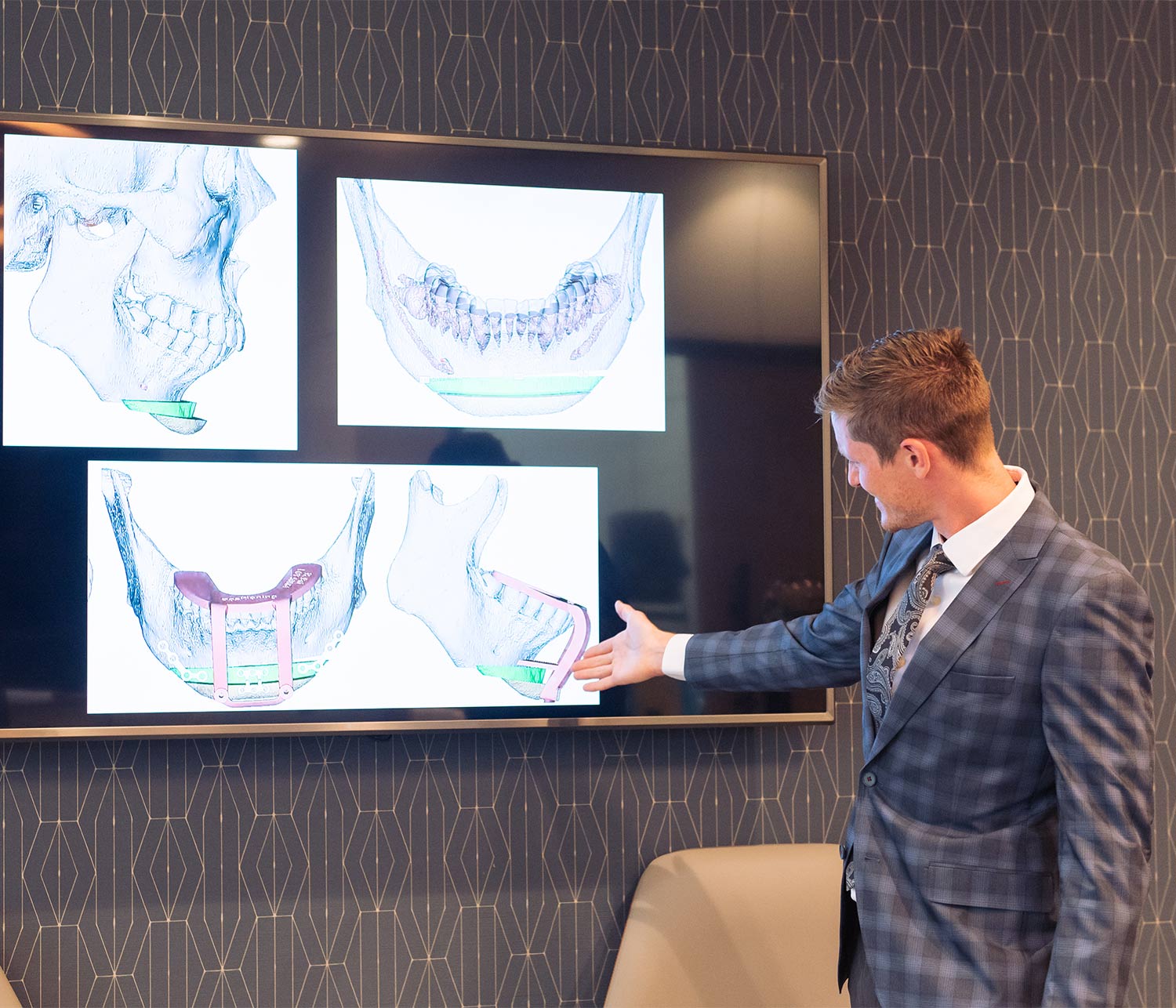
Our goal is to ensure our patients feel better and happier about their smile
Your dentist or orthodontist may have recommended the need for orthognathic surgery (jaw surgery).
These surgeries may be required when one or both jaws do not grow at the same rate and the teeth or bite do not fit together. These discrepancies can lead to problems with chewing, speech disturbances, mouth breathing and/or facial appearance concerns.
- To improve your jaw function and bite.
- For smile asymmetry correction
- To correct breathing problems
- To relieve jaw pain
- To improve speech problems
- For health benefits such as improved sleep, chewing and swallowing
What to expect
If you are a candidate for jaw surgery
Your orthodontist will straighten your teeth with braces first. Jaw surgery will be performed afterwards by your surgeon to move the jaws into the optimum position, which will result in a more pleasant and functional bite.
Jaw surgery is routinely performed in the hospital under a general anesthetic.
The surgeries are performed from the inside of the mouth and rigid fixation (plates and screws) are used to hold the jaws in the correct position. Your jaws are not wired together which makes your recovery much easier and faster. Most patients stay in the hospital for one or two days after the surgery.
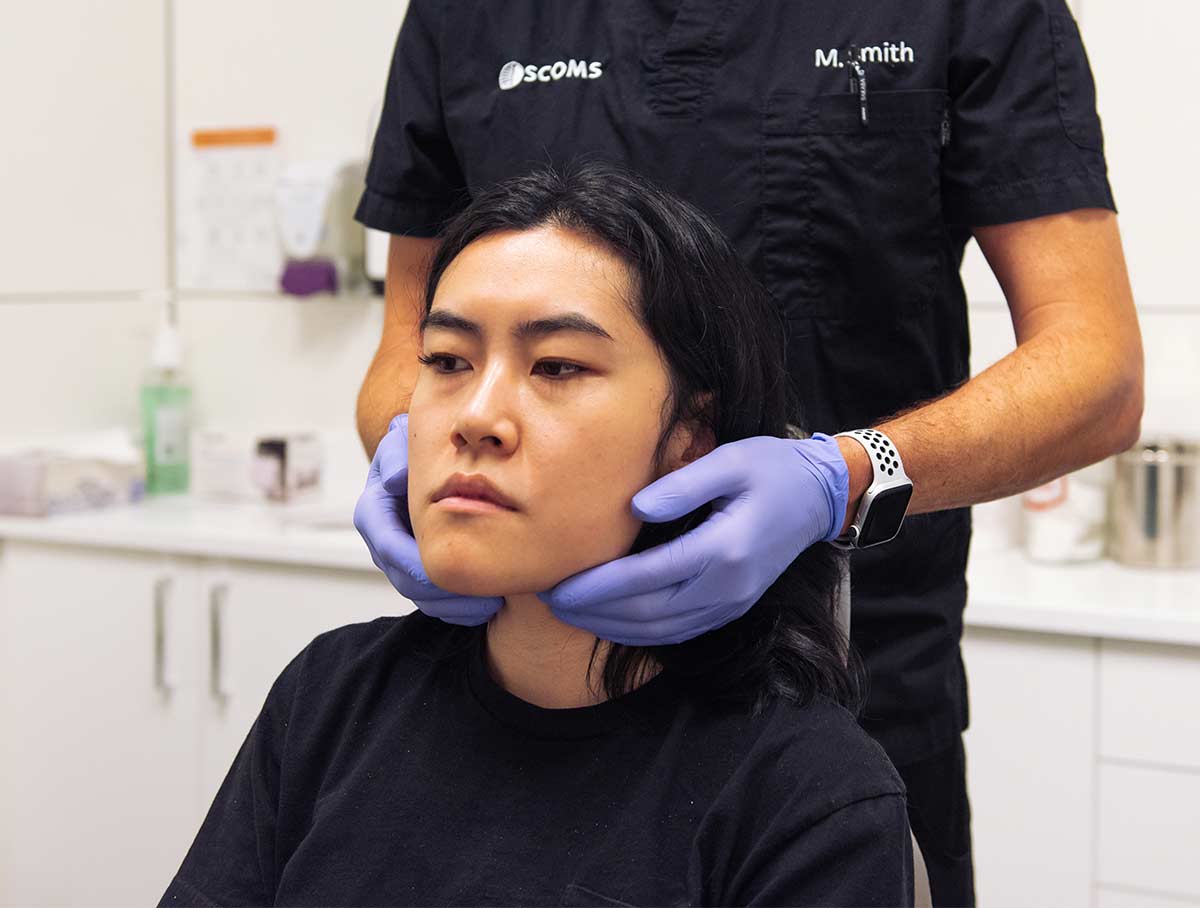
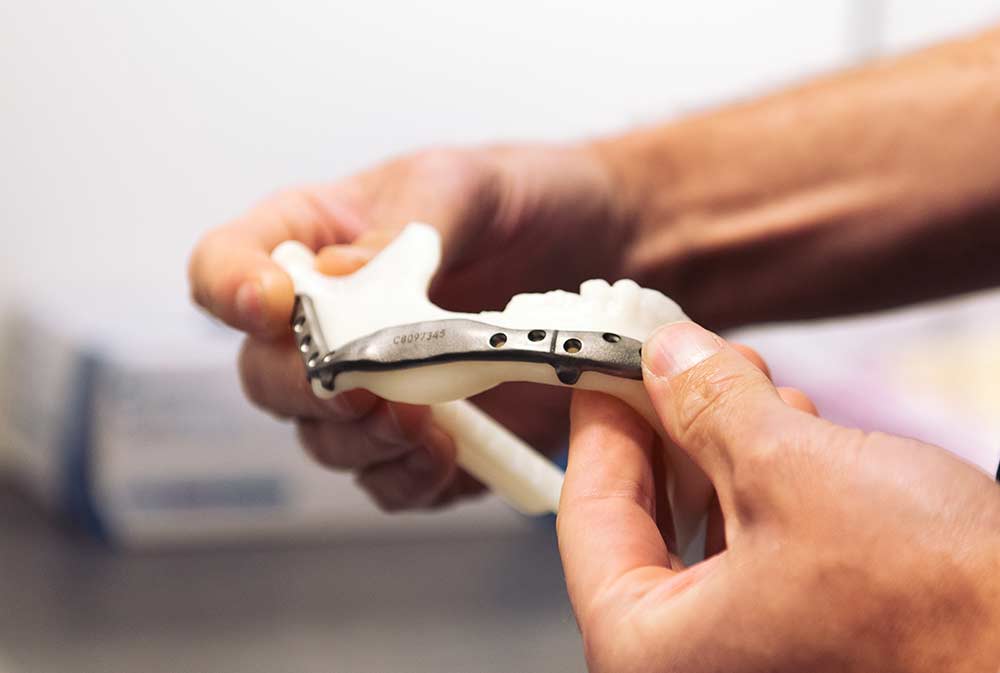
- Orthognathic Surgery: Post-operative instructions
- Significant swelling is expected. This will peak at 48 hours. Swelling is present for at least 2-3 weeks and up to 3-4 months following surgery. Residual swelling can take up to 1 year to completely subside.
- Sleep with your head elevated on 2-3 pillows for at least one week.
- Bleeding can persist on and off for 2-4 days after surgery. Sit upright and apply ice and pressure as tolerated.
- Bruising can be profound and extend onto the neck and chest. This may last for 1-2 weeks.
- Profuse nosebleeds that do not slow down with pressure are an emergency. Call 911 first and then our office. These may occur days or even weeks following upper jaw surgery.
- Use ice 20 minutes ON and 20 minutes OFF for the first 48 hours after surgery. Ice can also be used for up to 5 days following surgery to help with discomfort. After 4-5 days, switch to moist heat.
- Take all pain medications as prescribed; Alternate the anti-inflammatory (eg. ibuprofen, naproxen) with the Tylenol-based medication (eg. Extra Strength Tylenol, Tylenol #3, Tramacet) every 3 hours (ie. start with ibuprofen → 3 hours later → Tylenol product → 3 hours later → ibuprofen → 3 etc.).
- Stay on a liquid or non-chew pureed diet until you are instructed otherwise by your surgeon. You will be on a no chew diet for at least 6 weeks. Do not use a straw for one month following surgery.
- Nausea may occur for the first few days after surgery. Drinking clear fluids (eg. water or ginger-ale) can help ease nausea. Taking medications with food (ie. pureed diet) will help prevent it as well.
- If nausea persists, avoid any narcotic medications. Try to use ibuprofen and plain Tylenol for management of any discomfort.
- Use the prescribed mouth rinse 3-4 times daily (after eating and before bedtime). Rinse for 1 minute then spit; do not swallow. Rinse several times a day with salt water as well.
- The day following surgery, you can gently brush your teeth (using a baby or child extra soft toothbrush) in and around your braces (if present). Do not brush your gums.
- Start changing your elastics 48 hours after surgery (take a photo to remind yourself of placement). Fresh elastics should be used every 1-2 days.
- Dissolving stitches are commonly used. These may dissolve in 10-14 days OR may last for up to 4-6 weeks depending on the type of suture used.
- Early mobilization and walking assist with recovery. Sit upright in a chair to help with swelling and breathing.
- Do not lift more than 15 pounds for at least 6 weeks. No heavy lifting or vigorous exercise for 6 weeks.
- Avoid all contact sports or activities that put you at risk for getting hit in the face for at least 2-3 months.
- If you have had upper jaw surgery performed, do not blow your nose for one month following surgery.
- Do not smoke cigarettes, e-cigarettes or marijuana after surgery as this affects healing.
- If you have had a Surgically-Assisted Rapid Palatal Expansion, you will be shown how to turn your appliance at your 1-week follow-up appointment. Schedule regular follow-up appointments with your orthodontist (starting the week after surgery) so they can monitor the expansion.
Please call our office first with any questions or concerns at 403-271-1665 or 1-800-342-0382. A doctor is on-call 24 hours/day, 7 days/week. If you are calling after hours, please listen to the emergency message at the phone number(s) provided. You can then leave a message at the designated phone number and the Doctor will call you back. If you are admitted to the hospital within 10 days of surgery, please notify us immediately.
Bone graft
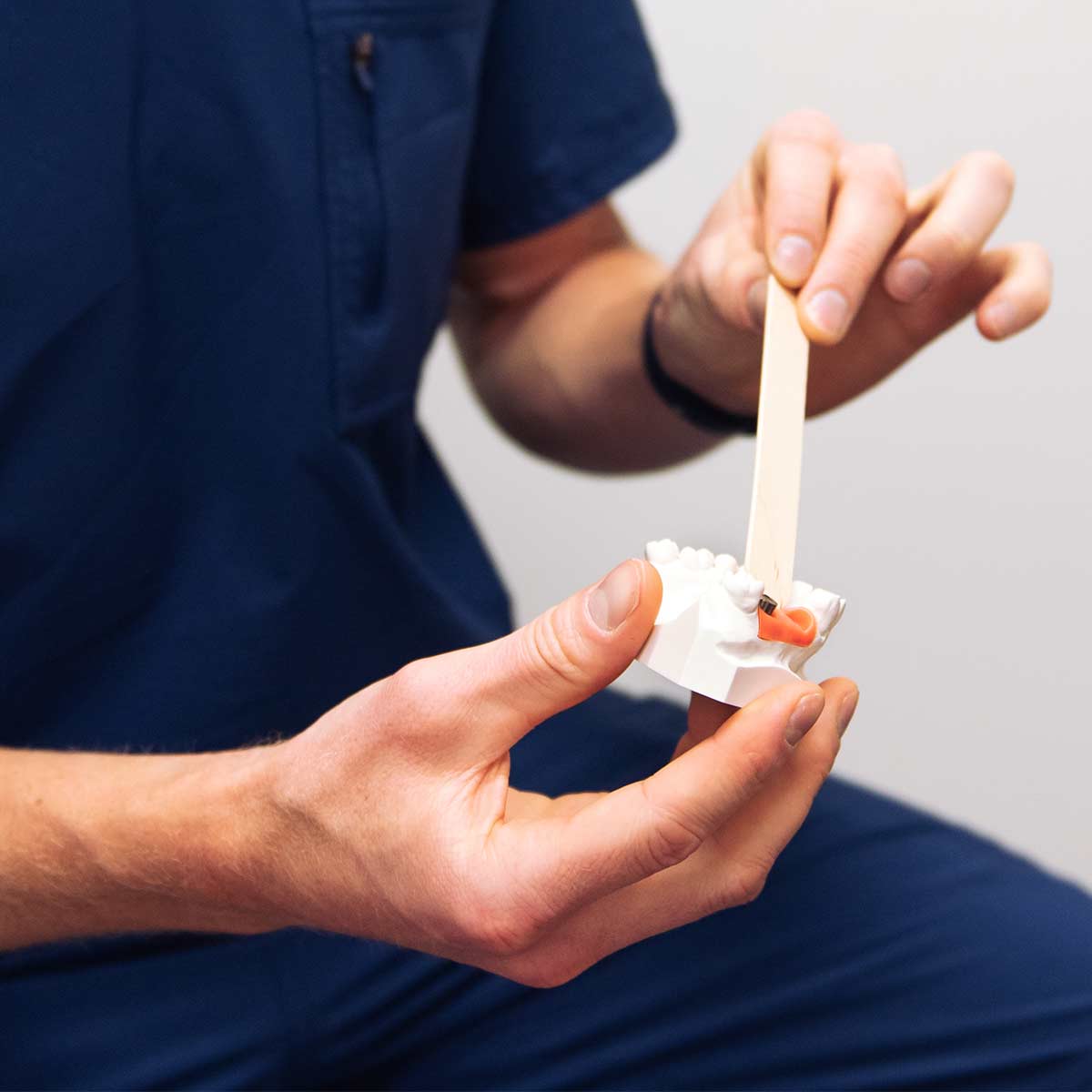
Bone grafting can enhance implant sites with inadequate bone structure due to previous extractions, gum disease or injuries.
Over a period of time, the jaw bone associated with missing teeth shrinks.
This results in poor quality and a reduced amount of bone suitable for the placement of dental implants. Today, we can replace bone where needed. This allows us to place implants of ideal length and width and restore function and aesthetics.
More information about Bone Grafting
Bone grafting can enhance implant sites with inadequate bone structure due to previous extractions, gum disease or injuries. We typically use your own bone or donor bone from a reputable bone bank. Your own bone can be taken from the jaw, hip or tibia (below the knee.) In addition, special membranes may be utilized that dissolve under the gum and protect the bone graft and encourage bone healing. This is called guided bone regeneration. Major bone grafts are typically performed to repair defects of the jaws either to the lower jaw, upper jaw or sinus. These defects may arise as a result of traumatic injuries, tumor surgery, or longstanding tooth loss. These procedures are routinely performed in our facility.
The maxillary sinuses are above your upper posterior teeth. Some of the roots of upper teeth extend up into the maxillary sinuses. When these upper teeth are removed, there is often a thin wall of bone separating the maxillary sinus and the mouth. Dental implants need bone to hold them in place. When the sinus wall is very thin, it is impossible to place dental implants in this bone. There is a solution and it’s called a sinus graft or a sinus lift. The dental implant surgeon enters the sinus from where the upper teeth used to be. The sinus membrane is then lifted upward and bone is inserted into the floor of the sinus. After several months of healing, the bone becomes part of the patient’s jaw and dental implants can be inserted and stabilized in this new sinus bone. The sinus graft makes it possible for many patients to have dental implants when years ago there was no other option other than wearing loose dentures. If enough bone between the upper jaw ridge and the bottom of the sinus is available to stabilize the implant, sinus augmentations and implant placement can sometimes be performed as a single procedure. If not enough bone is available, the Sinus Augmentation will have to be performed first, then the graft will have to mature for several months, depending upon the type of graft material used. Once the graft has matured, the implants can be placed.
- Bone Grafting: Post-operative instructions
- Swelling is expected to peak at 48 hours and will likely be present for at least 2-3 weeks following surgery.
- Sit upright, apply ice and gauze pressure as tolerated. Bleeding can persist on and off for 2-4 days.
- Sleep with your head elevated on 2-3 pillows for at least one week.
- Use ice 20 minutes ON and 20 minutes OFF for the first 48 hours after surgery. Ice can also be used for up to 4-5 days following surgery to help with discomfort. After 4-5 days, switch to moist heat.
- Take all pain medications as prescribed for at least 48 hours. Alternate the anti-inflammatory (eg. ibuprofen, naproxen) with the Tylenol-based medication (eg. Tylenol 3) every 3 hours (ie. start with ibuprofen—> 3 hours later—>Tylenol product—> 3 hours later—> ibuprofen—> etc.).
- Use ice 20 minutes ON and 20 minutes OFF for the first 48 hours after surgery. Ice can also be used for up to 4-5 days following surgery to help with discomfort. After 4-5 days, switch to moist heat.
- Take all pain medications as prescribed for at least 48 hours. Alternate the anti-inflammatory (eg. ibuprofen, naproxen) with the Tylenol-based medication (eg. Extra Strength Tylenol, Tylenol #3, Tramacet) every 3 hours (ie. start with ibuprofen—> 3 hours later—>Tylenol product—> 3 hours later—> ibuprofen—> etc.).
- Nausea may occur for the first few days after surgery. Drinking clear fluids (eg. water or ginger-ale) can help ease nausea. Taking medications with food will also help.
- If nausea persists, avoid narcotic medications. Try using ibuprofen and plain Tylenol for management of any discomfort.
- Stay on a soft chew diet for at least 3 weeks following surgery. Your surgeon will direct any diet changes/recommendations moving forward. Do not use a straw for one month following surgery.
- Diet:
- Soft chew
- blended
- liquid for
- You may have had antibiotics prescribed. Please take them to completion.
- Use the prescribed mouth rinse 3-4 times daily (after eating and before bedtime). Rinse for 1 minute then spit; do not swallow. Rinse several times a day with salt water as well.
- The day after surgery, you can begin brushing your teeth – teeth next to any surgical area(s) should be brushed gently). If dental implants have been placed and a portion of your implant structure is visible (ie. the healing abutment), you may start brushing the abutments 1 week after surgery. Use only a manual toothbrush to this area. You may use your electric toothbrush to your other teeth. No flossing adjacent to the implants for 2 weeks.
- Dissolving stitches are commonly used. These may dissolve in 10-14 days OR may last up to 4-6 weeks depending on the type of suture used.
- If you have any non-dissolving sutures, you will receive an appointment for removal.
- Please contact us immediately if you notice that tissues have “opened up” to the graft site and/or implant site.
- Early mobilization and walking assist with recovery. Sit upright in a chair to help with swelling and breathing.
- Do not lift more than 5-10 pounds for at least 6 weeks as directed.
- Avoid all contact sports or activities that put you at risk for getting hit in the face for at least 2-3 months.
- Do not smoke cigarettes, e-cigarettes or marijuana as this affects healing.
- If you have had a Sinus Lift Bone Graft performed, please avoid blowing your nose for at least one month following surgery (refer to additional instructions).
Please call our office first with any questions or concerns at 403-271-1665 or 1-800-342-0382. A doctor is on-call 24 hours/day, 7 days/week. If you are calling after hours, please listen to the emergency message at the phone number(s) provided. You can then leave a message at the designated phone number and the Doctor will call you back. If you are admitted to the hospital within 10 days of surgery, please notify us immediately.
Other procedures
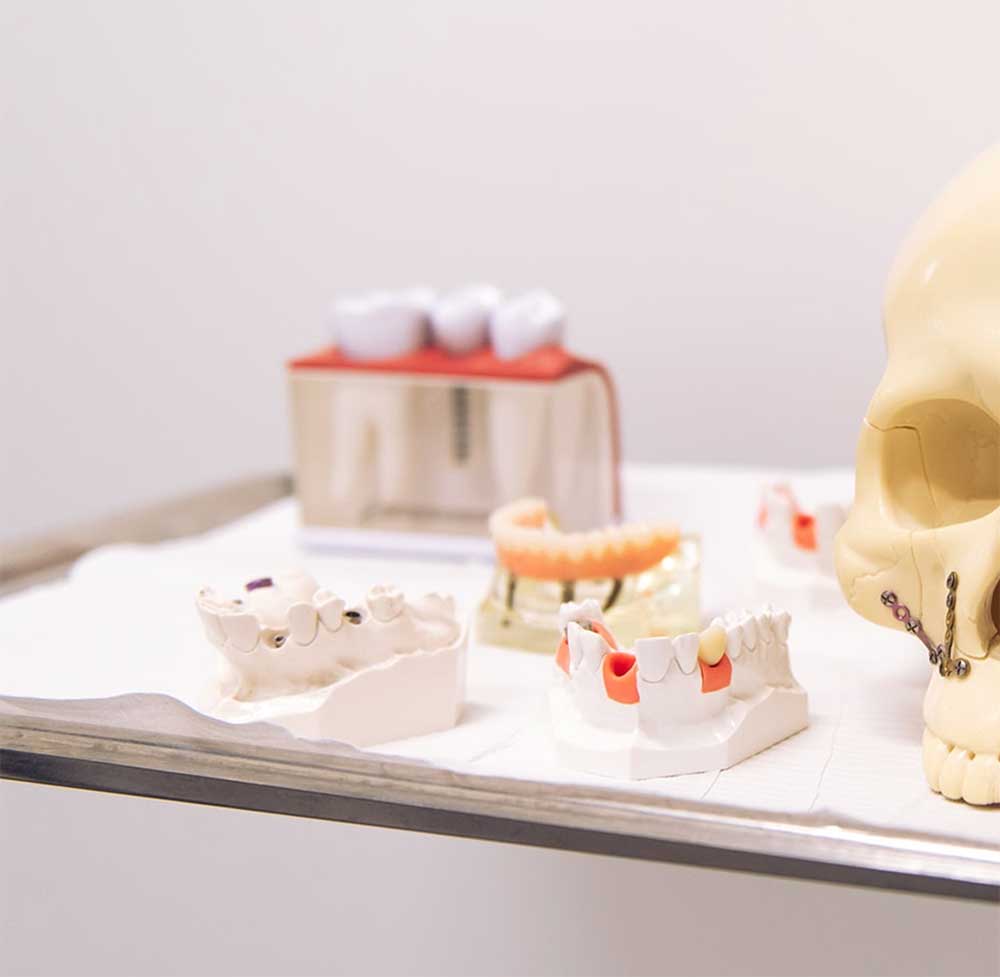
Other surgical procedures offered at South Calgary Oral & Maxillofacial Surgery include:
Diagnosis and management of Oral Pathology including oral cancer
Surgical management of TMJ dysfunction
Jaw advancement surgery for treatment of Obstructive Sleep Apnea
Cleft Surgery
CT Imaging -
Please call our office first with any questions or concerns at 403-271-1665 or 1-800-342-0382. A doctor is on-call 24 hours/day, 7 days/week. If you are calling after hours, please listen to the emergency message at the phone number(s) provided. You can then leave a message at the designated phone number and the Doctor will call you back. If you are admitted to the hospital within 10 days of surgery, please notify us immediately.
CBCT
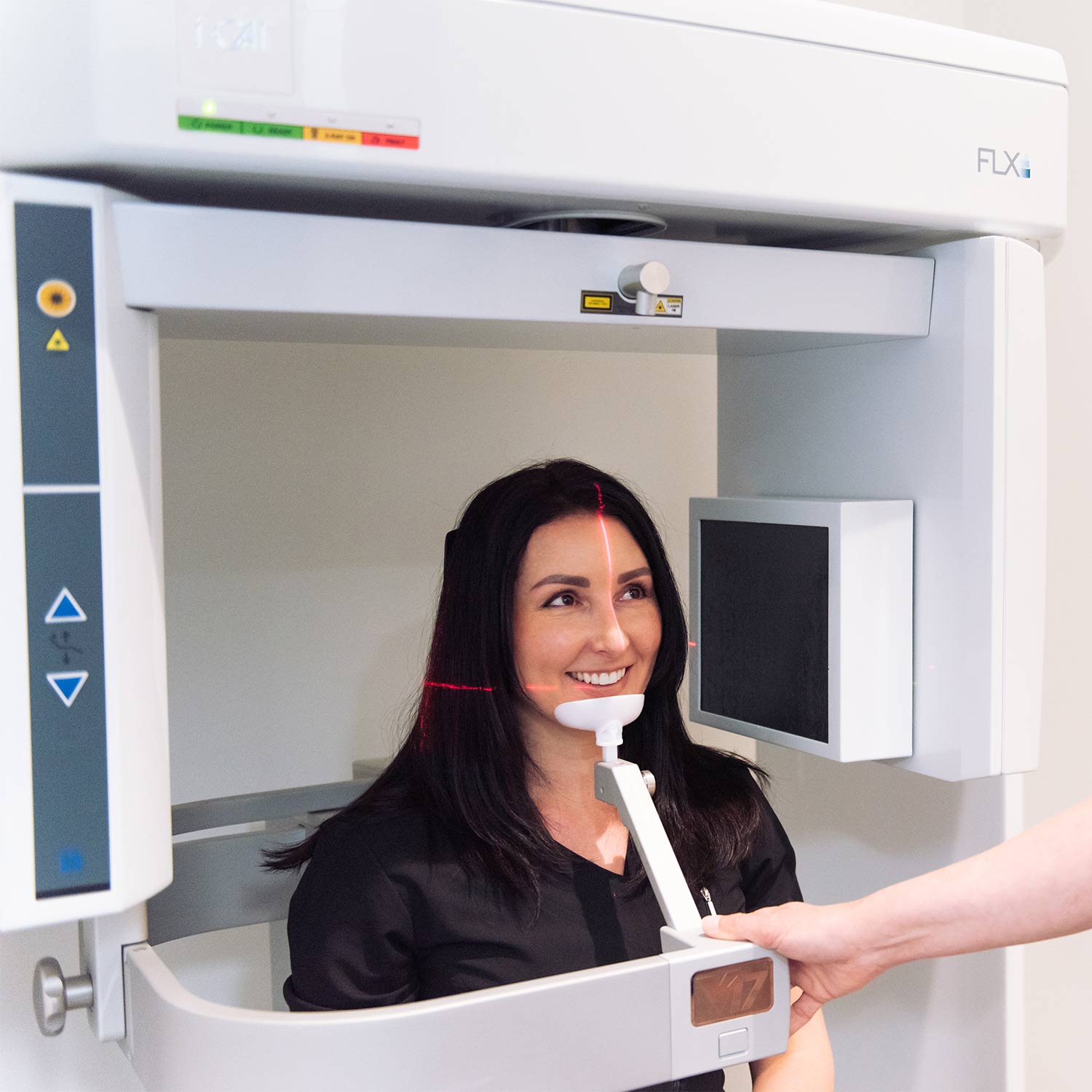
We provide CBCT imaging and Reporting.
Oral radiology services provided:
3D ICAT scan
3D Implant scan
Interpretation of existing CBCT
Please call our office first with any questions or concerns at 403-271-1665 or 1-800-342-0382. A doctor is on-call 24 hours/day, 7 days/week. If you are calling after hours, please listen to the emergency message at the phone number(s) provided. You can then leave a message at the designated phone number and the Doctor will call you back. If you are admitted to the hospital within 10 days of surgery, please notify us immediately.
Based on the needs and budget of each one of our patients we create a roadmap to try to get the ideal result. We educate and answer questions every step of the way. While providing the surgical aspect of care, we work with your dentist, hygienist, prosthodontist, denturist and other dental professionals.